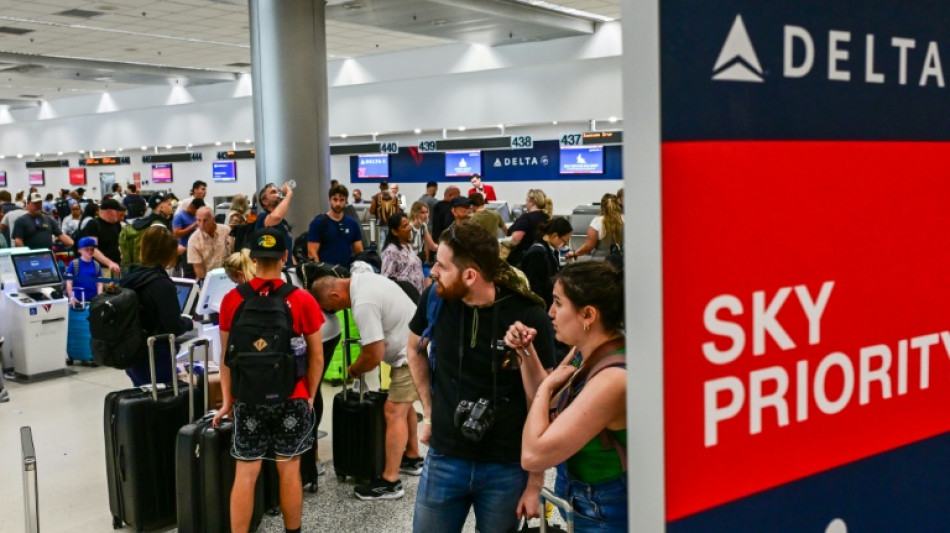
-
 Dolphins star Hill suffers gruesome injury in Jets clash
Dolphins star Hill suffers gruesome injury in Jets clash
-
Paralympics' vote to lift Russian suspension 'bold step' as conflict rages: ex-IOC executive

-
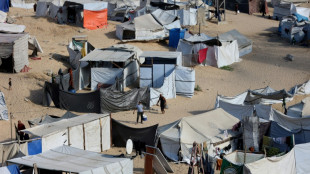 Gazans say Trump's peace plan a 'farce'
Gazans say Trump's peace plan a 'farce'
-
UN Security Council to vote on future of foreign Haiti force

-
 Far-right German MP's ex-aide faces verdict in China spy case
Far-right German MP's ex-aide faces verdict in China spy case
-
YouTube to pay $22 million in settlement with Trump

-
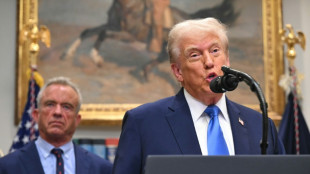 Internet outrage over Trump's AI conspiracy video
Internet outrage over Trump's AI conspiracy video
-
Coalition of states vows to protect access to abortion pill under Trump review

-
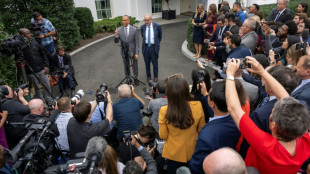 Trump meets Democrats without breakthrough on imminent shutdown
Trump meets Democrats without breakthrough on imminent shutdown
-
Muslim states join EU powers in backing Trump Gaza plan
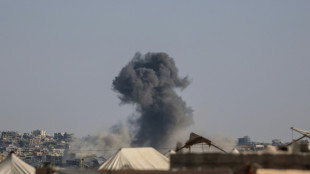
-
 California enacts AI safety law targeting tech giants
California enacts AI safety law targeting tech giants
-
Creator says AI actress is 'piece of art' after backlash

-
 Nuno makes his point as West Ham rescue Everton draw
Nuno makes his point as West Ham rescue Everton draw
-
Slot challenges Liverpool players to 'give their all' against Galatasaray

-
 Dodgers eye rare repeat as MLB playoffs get under way
Dodgers eye rare repeat as MLB playoffs get under way
-
Solanke surgery leaves Spurs struggling for strikers

-
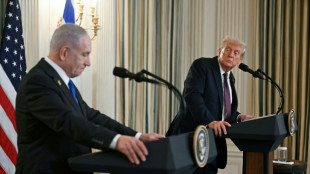 Trump's Gaza peace plan wins Netanyahu backing
Trump's Gaza peace plan wins Netanyahu backing
-
New-look Paris Fashion Week kicks off with Saint Laurent

-
 Anthropic launches new AI model, touting coding supremacy
Anthropic launches new AI model, touting coding supremacy
-
Trump announces Gaza peace plan, with Netanyahu backing
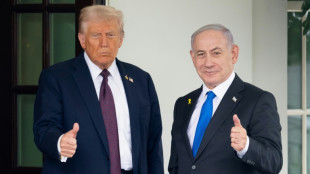
-
 'Better, stronger' Wembanyama can't wait for NBA return
'Better, stronger' Wembanyama can't wait for NBA return
-
LeBron relishing 23rd season as retirement draws near

-
 'Always a blue': Mourinho expects Chelsea fans to show respect
'Always a blue': Mourinho expects Chelsea fans to show respect
-
Michigan governor asks to 'lower the temperature' after church attack
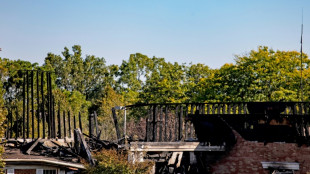
-
 S. Africa lose World Cup qualifying points over ineligible player
S. Africa lose World Cup qualifying points over ineligible player
-
Rugby chiefs open to R360 role in women's game after World Cup success

-
 Inter Milan announce 35.4 million euro profits ahead of San Siro vote
Inter Milan announce 35.4 million euro profits ahead of San Siro vote
-
Madagascar protests reignite, UN says at least 22 dead
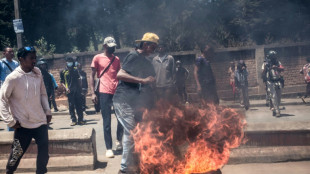
-
 Taliban shut down communications across Afghanistan
Taliban shut down communications across Afghanistan
-
Serbia arrests 11 accused of stirring Jewish-Muslim hate in France, Germany

-
 J.K. Rowling attacks 'ignorant' Harry Potter star Emma Watson
J.K. Rowling attacks 'ignorant' Harry Potter star Emma Watson
-
Electronic Arts to be bought by Saudi-led consortium for $55 bn
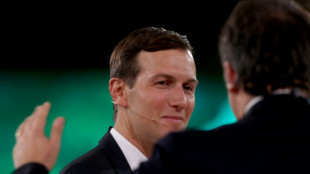
-
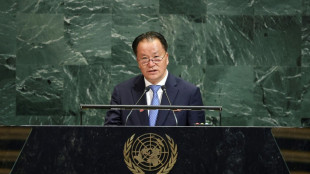 N.Korea vows at UN never to give up nuclear
N.Korea vows at UN never to give up nuclear
-
Hamilton reveals 'hardest decision' over dog's death

-
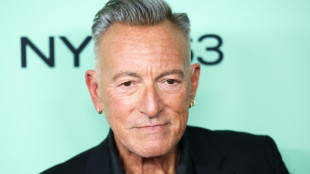 Springsteen denounces 'hatred' in America at biopic premiere
Springsteen denounces 'hatred' in America at biopic premiere
-
Stock markets shrug off US government shutdown fears
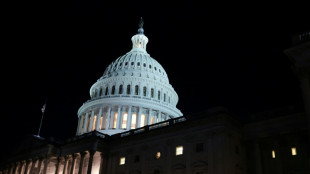
-
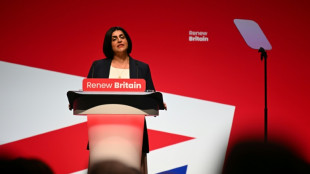 UK's Labour plans tougher rules on migrants to halt hard right
UK's Labour plans tougher rules on migrants to halt hard right
-
Trump 'very confident' of Gaza deal as he hosts Netanyahu
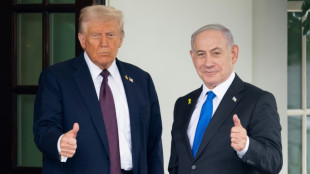
-
 'High chance' of India winning Women's Cricket World Cup: captain Kaur
'High chance' of India winning Women's Cricket World Cup: captain Kaur
-
Trump meets Democrats in last-gasp talks before US government shutdown
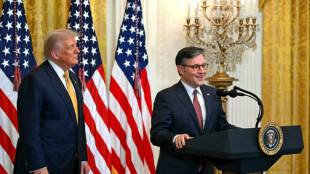
-
 No 'Angels': Bulgarians shake down Robbie Williams convoy
No 'Angels': Bulgarians shake down Robbie Williams convoy
-
German music body sues OpenAI alleging copyright breaches

-
 Cannabis extract relieves chronic back pain: high-quality trial
Cannabis extract relieves chronic back pain: high-quality trial
-
African players in Europe: Sarr helps sink leaders Liverpool

-
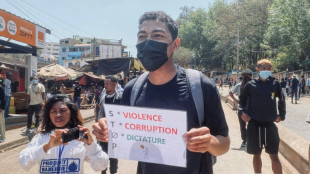 Madagascar protests reignite as police launch tear gas
Madagascar protests reignite as police launch tear gas
-
German finds 15mn-euro winning lotto ticket in coat
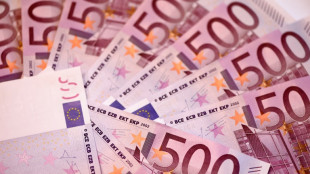
-
 Injury retirements hit China Open but Sinner reaches semis unscathed
Injury retirements hit China Open but Sinner reaches semis unscathed
-
TotalEnergies to boost output, cut $7.5 bn in costs

-
 World Rugby unfazed over England dominance of women's game
World Rugby unfazed over England dominance of women's game
-
Bruised Real Madrid still defining spirit, personality: Alonso


Trump learns lessons from first 'Muslim ban' but raises new questions
In banning most travel to the United States by citizens of 12 countries, President Donald Trump is fine-tuning a playbook popular with his base, even as his singling out of particular nations left many scratching their heads.
Trump rose to power vowing a harsh line on non-European immigration to the United States, thrilling crowds during his 2016 campaign by vowing a wall with Mexico and stunning the then political establishment by urging a "complete shutdown" of Muslims entering the country.
On entering the White House the first time in 2017, he swiftly banned travel from seven Muslim-majority countries, prompting mass protests at airports as critics derided his "Muslim ban."
With his new travel restrictions, Trump is again targeting US adversaries. But he has also made more exemptions and included travel from several small African countries that not major sources of visitors -- Chad, the Republic of the Congo and Equatorial Guinea.
Chad maintains more cooperation with the West than military-run Mali, Niger and Burkina Faso, which were not affected, and last year held elections, although their conduct was criticized.
Several other small nations faced a partial ban including Burundi, Sierra Leone, Togo and, in Central Asia, Turkmenistan.
The White House in said in a fact sheet that countries were put on the blacklist due to terrorism ties or because of high rates of their citizens overstaying visas.
Others were targeted as they lack central governing authority. They include violence-ravaged and predominantly Black Haiti, whose migrants have long been maligned by Trump, who last year spread unfounded conspiracy theories that they were eating native-born Americans' pets in Ohio.
Alex Nowrasteh, vice president for economic and social policy studies at the libertarian Cato Institute, said Trump's motivation was to decrease legal immigration and asked: "The only real mystery is what took him so long?"
"It's not totally crazy to think that they chose countries that don't matter much -- in terms of not sending many migrants here -- and that throwing them on the list probably helps their marketing," Nowrasteh said.
"It's not going to have an enormous effect on our economy or society," he said of the new ban. "What I think it really does is undermine the American reputation of standing with people around the world who are fighting for freedom."
- 'Extreme dangers'? -
Trump justified the new measures by pointing to an attack on a Jewish protest in Boulder, Colorado by an Egyptian man who had been seeking asylum.
Trump in a message said the attack showed the "extreme dangers posed to our country by the entry of foreign nationals who are not properly vetted."
But Egypt -- a longstanding US ally and aid recipient due largely to its relations with Israel -- was not targeted.
Other major nations left off the blacklist included Pakistan, which India has long accused of supporting extremists, triggering a four-day conflict last month after a massacre of tourists in Indian-administered Kashmir.
Pakistan maintains intelligence cooperation with the United States and Trump thanked Islamabad in March for arresting a suspect over an attack that killed US troops during the 2021 withdrawal from Afghanistan.
On the other hand, Afghanistan was on the blacklist due to the Taliban government. An exemption was made for Afghans who helped the fallen Western-backed government, although Trump has cut funding to implement that program.
"Let's be clear: this policy is not a response to any new threat," said Shawn VanDiver, head of the AfghanEvac group that supports Afghan allies.
"It's a long-planned political move, delayed until the aftermath of the Boulder attack to give it the appearance of urgency. This is about optics and fear, not safety," he said.
Among the chief targets both in the first term and now has been Iran, an arch-enemy of the United States since the 1979 Islamic revolution.
Iranian-Americans have among the highest incomes of any ethnic group in the United States and the community is overwhelmingly critical of the government in Tehran.
“National origin tells us nothing about whether an individual is a terrorist threat. Yet, that is precisely what Trump's bans have been based on," said Jamal Abdi, president of the National Iranian American Council.
S.Spengler--VB

